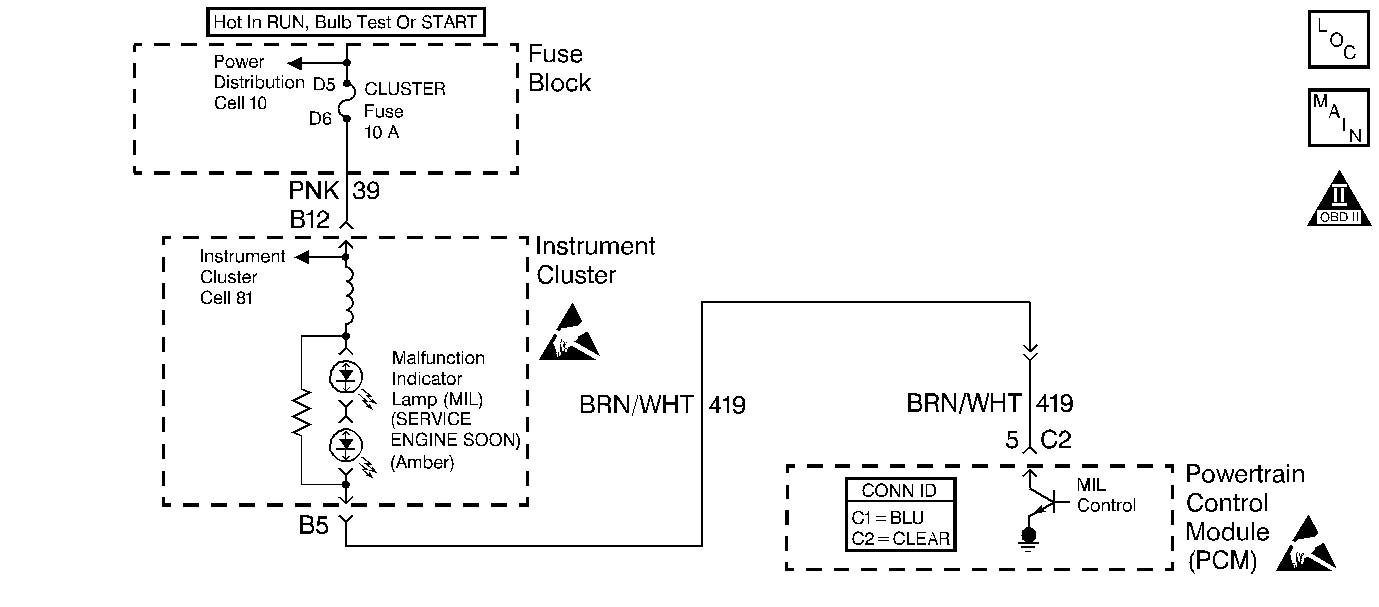Mil Lamp

Circuit Description
There should always be a steady MIL with the ignition ON and the engine stopped. Ignition feed voltage is supplied directly to the MIL bulb. The Powertrain Control Module (PCM) turns the MIL ON by grounding the MIL driver circuit. No MIL with the key ON, engine not running and DTC P1671 set suggests an open in the MIL driver circuit.
MIL Operation
The Malfunction Indicator Lamp (MIL) is located on the instrument panel (CHECK ENGINE) or (SERVICE ENGINE SOON). The MIL performs the following functions:
| • | It informs the driver that a problem has occurred and that the vehicle should be taken for service as soon as possible. |
| • | As a bulb check and system check, the MIL will illuminate with the ignition switch ON and the engine not running. when the engine is started, the MIL will turn OFF. If the MIL remains ON, the self-diagnostic system has detected a problem. If the problem goes away, the MIL will turn OFF in most cases, but a diagnostic trouble code will remain stored. |
| • | If the MIL is illuminated, then the engine stalls, the MIL will remain Illuminated so long as the ignition switch is ON. |
| • | Now, if the MIL is not illuminated and the engine stalls, the MIL will not illuminate until the ignition switch is cycled OFF, then ON. |
Perform the Powertrain On-Board Diagnostic System Check first, when the following conditions are present:
| • | When the MIL does not turn ON when the the ignition switch is turned to the RUN position |
| • | When the MIL remains ON while the engine is running |
| • | When you suspect a driveability problem |
Diagnostic Aids
An intermittent may be caused by a poor connection, rubbed through wire insulation or a wire broken inside the insulation. Check for the following items:
| • | Inspect the PCM harness and connectors for improper mating, broken locks, improperly formed or damaged terminals, poor terminal to wire connection, and damaged harness. |
| • | If the engine runs OK, check for a faulty light bulb, an open in the MIL driver circuit, or an open in the instrument cluster ignition feed. |
| • | If the engine cranks but will not run, check for an open PCM ignition or battery feed or a poor PCM to engine ground. |
Number(s) below refer to the step number(s) on the Diagnostic Table:
-
A no MIL condition accompanied by a no start condition suggests a faulty PCM ignition feed or battery feed circuit.
-
Using a test lamp connected to B+, probe each of the PCM ground terminals to ensure that a good ground is present.
Step | Action | Value(s) | Yes | No |
1 | Was the Powertrain On-Board Diagnostic (OBD) System Check performed? | -- | ||
2 | Is any DTC stored? | -- | Go to Applicable DTC | |
3 | Check the PCM ignition feeds and battery feed fuses. Are the fuses OK? | -- | ||
Attempt to start the engine. Does the engine start? | -- | |||
5 |
Is the test lamp ON? | -- | ||
6 | Probe the battery feed circuit at the PCM harness connector with a test lamp to ground. Is the test lamp ON? | -- | ||
7 |
Was a problem found? | -- | -- | |
8 | Locate and repair open in PCM battery feed circuit or PCM ignition feed circuit as necessary. Refer to Wiring Repairs . Is action complete? | -- | -- | |
9 | Locate and repair short to ground in PCM ignition feed circuit or PCM battery feed circuit as necessary. Refer to Fuse Block Schematics . Is action complete? | -- | -- |
